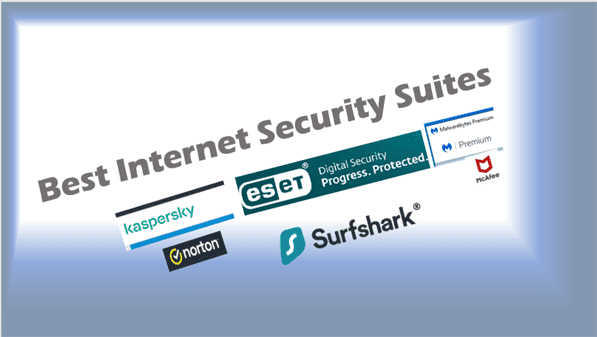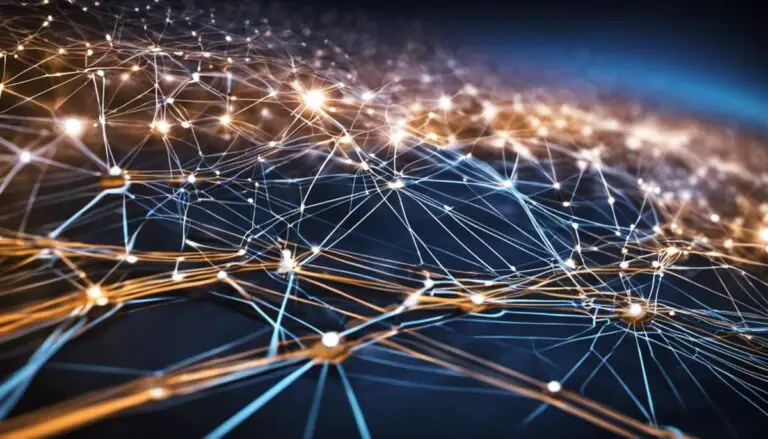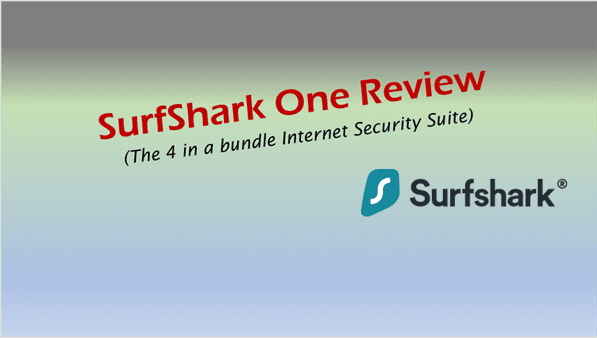What is a VPN and How Does it Work? (Plus Why You Absolutely Need One)
If you’ve ever wondered, what is a VPN and how does it work while sipping coffee on public Wi-Fi, you’re not alone.
We’ve all heard about online security, hackers, and dodgy networks.
But here’s the thing: the internet isn’t safe unless you’re protected.
A VPN, short for Virtual Private Network, is the tool you need to stay private and secure when browsing.
It encrypts your data, keeps prying eyes away, and even helps you access geo-blocked content.
Sound like tech jargon? Don’t worry.
Today, I’ll explain how a VPN works, why you absolutely need one, and how to choose the best VPN for your needs.
Let’s make this simple. Stick around because by the end, you’ll know everything about VPNs and how they can save you from a world of trouble.
1. What is a VPN? Breaking Down the Basics
A VPN stands for Virtual Private Network.
It’s a tool that hides your IP address and encrypts your internet connection, making your online activities invisible to snoopers.
Think of a VPN like a tunnel between your device and a remote server operated by a VPN provider.
Instead of your traffic going straight to the internet, it passes through this secure VPN tunnel.
This way, your real IP address and location remain hidden.
Learn more about what a VPN is and how it works here.
2. How Does a VPN Work? Simplified for Beginners
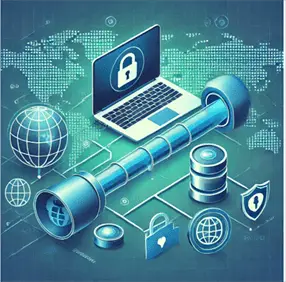
Here’s how a VPN works:
- When you connect to a VPN, your device creates an encrypted connection to a VPN server.
- Your traffic travels through this secure tunnel to the server.
- The server then forwards your traffic to the internet using its own IP address.
This process:
- Hides your IP address.
- Encrypts your data so no one can spy on it.
- Makes it seem like you’re browsing from the VPN server’s location.
It’s that simple. A VPN acts like an invisibility cloak for your online identity.
3. Why Do You Need a VPN? Top Reasons to Use One
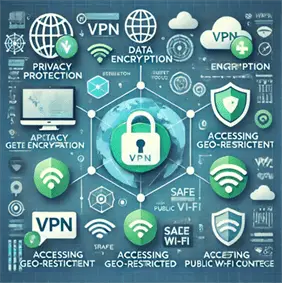
Let’s get real.
You need a VPN for three main reasons:
- Protecting Your Data: If you use public Wi-Fi at cafes, airports, or hotels, your private data is at risk. A VPN creates a secure connection to keep hackers out.
- Hiding Your Online Activity: Your internet service provider (ISP) tracks everything you do. A VPN masks your activity and stops ISPs from selling your data.
- Accessing Blocked Content: Want to watch Netflix shows not available in your country? Using a VPN lets you connect to servers in other regions.
Read about VPNs for remote work security.
4. What are the Different Types of VPNs?
There are two main types of VPNs:
- Remote Access VPN: Perfect for individuals who want to connect to a VPN server securely. It’s great for browsing, streaming, and working remotely.
- Site-to-Site VPN: Common in businesses to connect multiple private networks securely. This helps teams collaborate across locations.
Choosing the right type of VPN depends on your needs. For most people, a remote access VPN works perfectly.
5. How Does a VPN Protect Your Data on Public Wi-Fi?
Public Wi-Fi networks are a hacker’s playground.
When you use public Wi-Fi without a VPN:
- Your data (passwords, emails, credit card details) is exposed.
- Hackers can intercept your connection using tools like packet sniffers.
But when you use a VPN:
- Your connection becomes encrypted.
- Hackers can’t see your private information.
- You get a secure connection, even on a public Wi-Fi network.
Learn more about remote work security here.
6. Advantages of Using a VPN
Using a VPN offers massive benefits:
- Privacy Protection: Hide your IP address and prevent tracking.
- Data Security: Your data is encrypted, keeping it safe from hackers.
- Access Restricted Content: Stream, browse, and download content unavailable in your region.
- Avoid Bandwidth Throttling: ISPs often slow your connection. A VPN masks your activity to stop this.
- Work Securely: If you work from home, a VPN ensures your connection is private and secure.
The advantages of using a VPN are endless if you care about privacy.
Check out affordable VPNs for small businesses.
7. How to Set Up a VPN on Your Devices
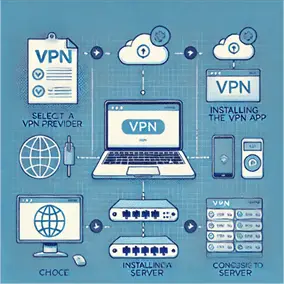
Setting up a VPN is surprisingly easy.
Here’s how you can do it:
- Choose a VPN provider (free or paid).
- Download the VPN client for your device (mobile, laptop, or tablet).
- Install the app and connect to a VPN server.
Within minutes, your internet connection will be encrypted, and your IP address hidden.
8. How to Choose the Best VPN Provider for You
Not all VPNs are created equal.
Here’s what to look for when choosing the best VPN:
- Speed: A slow VPN ruins the experience.
- Security: Ensure the VPN uses strong encryption protocols.
- Server Locations: More servers mean better options for bypassing restrictions.
- Privacy Policy: Choose a reputable VPN provider that doesn’t log your data.
- Pricing: Avoid free VPN services that often sell your data.
Want the best results? Stick to paid VPN services.
Discover the best VPN services here.
For a detailed breakdown of the must-have features, check out our VPN Checklist for Businesses to make an informed decision.
9. Common VPN Protocols You Should Know
VPNs rely on protocols to create secure connections.
Here are the most common ones:
- OpenVPN: The gold standard for security and speed.
- IKEv2/IPsec: Great for mobile devices.
- WireGuard: Faster and newer protocol gaining popularity.
Each protocol has its strengths, but for most people, OpenVPN is a solid choice.
Explore the best cheap VPN options.
10. FAQs About VPNs
Q: What is a VPN and how does it work?
A VPN (Virtual Private Network) encrypts your data and hides your IP address by routing your traffic through a remote server.
Q: Can I use a VPN on public Wi-Fi?
Absolutely! A VPN protects your data on public Wi-Fi networks by creating a secure connection.
Q: Are free VPNs safe?
Not really. Free VPN services often log your activity and sell your data. Stick with a reputable paid VPN provider.
Q: Can a VPN hide my IP address?
Yes, a VPN hides your IP address by replacing it with the address of the VPN server.
Q: How do I connect to a VPN?
Download the VPN app, install it, and connect to a VPN server with one click.
Summary: Key Things to Remember About VPNs
- A VPN encrypts your internet connection to keep your data private.
- It hides your IP address and protects your activity from hackers, ISPs, and snoopers.
- Using a VPN on public Wi-Fi is a must.
- Choose a VPN provider that offers strong security, speed, and a no-logs policy.
- Avoid free VPN services; invest in a reliable paid VPN provider.
By now, you know exactly what a VPN is and how it works.
It’s not just for tech nerds or businesses.
If you use the internet, you need a VPN to protect yourself.
Simple, safe, and effective.
So what are you waiting for? Use a VPN and take control of your online privacy today.
FAQs – What is a VPN and how does it work
Is there a downside to using a VPN?
Yes, while VPNs offer many benefits, there are some downsides:
Slower Internet Speeds: Since your traffic is rerouted through a remote server, using a VPN can sometimes slow down your connection. This is especially true if you connect to a server that is far away geographically or if the VPN provider lacks sufficient server capacity.
Source: NordVPN Support (https://support.nordvpn.com/General-info/1047407642/Why-is-my-internet-slow-when-connected-to-VPN.htm)
Cost: Premium VPNs, which offer the best speeds, privacy, and features, are not free. Free VPNs may compromise your data security and privacy.
Source: ExpressVPN Blog
Blocking and Restrictions: Some websites and streaming services actively block VPN traffic, making it difficult to access certain content.
Source: Surfshark Blog (https://surfshark.com/blog/netflix-block-vpn)
What is VPN and why do I need it?
A VPN (Virtual Private Network) is a service that protects your online privacy by encrypting your internet connection and hiding your IP address.
You need a VPN for several reasons:
Privacy Protection: It keeps your online activity hidden from Internet Service Providers (ISPs), hackers, and government surveillance.
Data Security: A VPN encrypts your traffic, ensuring your sensitive data is secure, especially on public Wi-Fi networks.
Access Geo-Restricted Content: It allows you to bypass regional restrictions and access streaming services or websites unavailable in your country.
Source: NordVPN (https://nordvpn.com/what-is-a-vpn/)
How do I use VPN for beginners?
Using a VPN is simple, even for beginners. Here’s a step-by-step guide:
Choose a VPN Provider: Select a reputable VPN service (e.g., ExpressVPN, NordVPN, Surfshark).
Download and Install the VPN App: Most VPN providers offer apps for Windows, macOS, iOS, Android, and other devices.
Log In: Sign in to your VPN app using your account credentials.
Connect to a Server:
Open the VPN app.
Select a server location (e.g., US, UK, or closest to you for better speeds).
Click “Connect.”
Browse Securely: Once connected, your IP address is hidden, and your internet connection is encrypted.
Source: ExpressVPN Setup Guide (https://www.expressvpn.com/setup/)
Are VPNs free?
Yes, there are free VPNs, but they come with significant limitations and risks:
Limited Features: Free VPNs often have restricted server options, slower speeds, and data caps.
Security Risks: Many free VPNs log and sell your data to third parties for profit, defeating the purpose of privacy.
Ads and Malware: Free VPN apps may display intrusive ads or even expose you to malware.
Source: ProtonVPN (https://protonvpn.com/blog/free-vpn-risks/)
For reliable and secure services, it’s recommended to use a paid VPN that guarantees privacy, faster connections, and robust encryption.
Source: Surfshark Blog (https://surfshark.com/blog/free-vpn-risks)
Further Reading:


